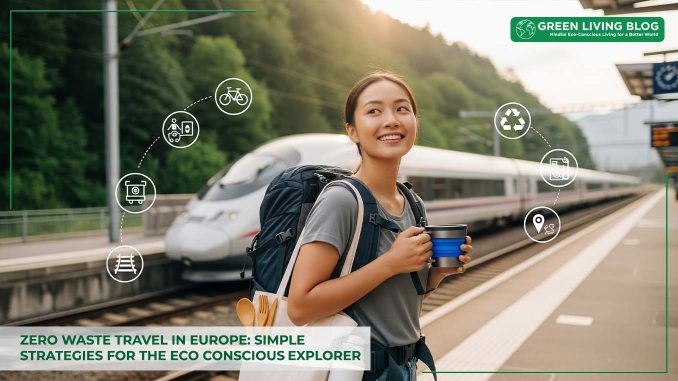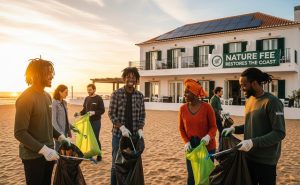
Picture the moment your eight‑kilogram carry‑on is zipped shut for a month‑long journey across Europe—only to realise that half of what’s inside will end up in a bin somewhere between Lisbon and Ljubljana.
Tickets, shampoo sachets, disposable coffee lids: each one a future fragment of landfill. The good news?
A few deliberate choices can shrink that pile to almost nothing while making the trip lighter, cheaper, and far more rewarding.
1. Pack Light—and Let Every Item Earn Its Place

Waste that never enters the backpack can never become trash. When weighing what to bring, favour objects with multiple uses and minimal packaging:
- Solid toiletries such as Marseille soap or shampoo bars replace three plastic bottles and pass airport liquid restrictions with ease.
- A quick‑dry scarf doubles as a blanket, a towel, and a picnic cloth, sparing hotel laundry and single‑use napkins.
- Refillable silicone bottles prevent the travel‑size toiletry graveyard.
- Collapsible mug and bamboo cutlery put an end to flimsy airline forks and coffee‑cup lids.
A bonus: lighter bags lower transport emissions. Studies from German aviation researchers show that removing just five kilograms from a suitcase on a short flight cuts roughly the same CO₂ as skipping a beef burger. Your shoulders, budget, and the planet all benefit.
2. Favour Low‑Carbon Transit—Rails, Wheels, and Renewables
Europe’s dense rail network is a gift to anyone chasing a smaller footprint. High‑speed lines such as the Paris‑Barcelona TGV, Amsterdam‑Berlin ICE, and Vienna’s Nightjet sleepers run increasingly on renewable electricity. When trains aren’t available, long‑distance coaches like FlixBus and BlaBlaCar Bus now offer bio‑LNG or offset programs.
At ground level, cities from Copenhagen to Seville operate public bike‑sharing schemes. Rural areas—Italy’s South Tyrol, France’s Loire Valley, Denmark’s Bornholm—offer way‑marked cycling trails and e‑bike rentals that make pedalling a pleasure rather than a chore. If flying is unavoidable, choose direct routes, pack light, decline in‑flight plastic where possible, and purchase the airline’s verified carbon offset.
3. Build a Street‑Market Survival Kit

Europe’s street‑food scene is irresistible and often wrapped in single‑use packaging. A tiny “survival kit” keeps impulse snacking zero‑waste:
- Two canvas totes fold down to nothing yet handle groceries, flea‑market finds, and wet beachwear.
- A stainless‑steel tiffin tin fits hot empanadas in Málaga, pierogi in Kraków, or vegan cannoli in Palermo without paper plates.
- A beeswax wrap or silicone pouch secures leftover bread, cheese alternatives, or sliced fruit.
- A stainless water bottle refills at taps and public fountains (safe across almost all of Western and Northern Europe). Where tap water is questionable, a UV‑purifying pen weighs under 100 g and replaces dozens of plastic bottles in a single week.
4. Sleep in Places That Live Your Values—Europe’s Vegan & Sustainable Hotels
Sustainable lodging used to mean re‑using towels. Today a wave of fully vegan, ultra‑green hotels proves that deep sustainability can feel downright indulgent. Three standout examples:
- Ahead Burghotel (Brandenburg, Germany) – A medieval moated castle converted into a plant‑based retreat. Geothermal heat pumps warm rooms; five‑course forest‑foraged dinners arrive free of plastic film or animal products.
- La Vimea (South Tyrol, Italy) – Alpine minimalism meets slow‑food ritual at this Italian vegan hotel. Electricity comes from local hydropower, a natural swimming pond skips chlorine, and homegrown beets appear as tartare worthy of Michelin gossip.
- Villa Vegana (Mallorca, Spain) – A 15th‑century finca insulated with cork and powered by rooftop solar. Kitchen scraps compost into on‑site orchards, later emerging as smoky‑paprika paella on the terrace.
Why vegan or green hotels matter beyond ethics: bedding, cleaning agents, and spa cosmetics are free of animal ingredients and harsh chemicals; kitchens source hyper‑local produce to slash food miles; renewable energy and grey‑water loops shrink carbon and water footprints well below industry averages. Across Europe, dozens more properties—Austria’s climate‑neutral Naturhotel Chesa Valisa, Greece’s Mod Santorini—invite travellers to vote with their wallets for a lower‑impact model of hospitality.
5. Go Digital, Ditch the Paper
Download boarding passes to a phone wallet, use apps like Komoot or Citymapper instead of printed maps, and snap photos of museum placards rather than lugging guidebooks. Even small reductions add up: a glossy city map requires roughly the same energy to produce as powering a smartphone for two days. Digital lightens bags, speeds checkpoints, and keeps waste out of overflowing tourist‑zone bins.
6. Choose Experiences Over Trinkets
Souvenir temptation is part of the fun—especially in places where craftsmanship and tourism intertwine. The key is utility. A hand‑thrown ceramic cup from Lisbon becomes a daily coffee ritual at home, displacing disposable lids. A linen bread bag from Vilnius keeps loaves fresh and plastic‑free. If an item lacks an obvious job in everyday life, photograph it, admire the artistry, and leave it for someone else. Memories weigh nothing and never end up in landfill.
7. Give Back on the Go
Zero‑waste isn’t only about subtraction; it’s also about addition. Spend a morning on a beach clean‑up in the Algarve or join a “plogging” run along Amsterdam’s canals. Many vegan hotels organise micro‑conservation projects—Ahead Burghotel hosts Elbe‑River litter picks, while Paradiso Pure Living funds alpine meadow restoration through a modest nightly nature fee. Contributing ties the journey to the community, transforming eco‑anxiety into tangible action.
8. Celebrate Progress, Not Perfection
Even the most diligent traveller will end up with the rogue receipt or plastic fruit sticker. The goal isn’t a jam‑jar of annual rubbish; it’s momentum. Celebrate the waste that never happened: the thirty coffee cups refused, the airline meal pre‑ordered vegan so plastic‑wrapped cheese trays stayed in the galley, the compost dropped into a Spanish orchard. Those micro‑choices ripple outward, nudging vendors, hoteliers, and fellow travellers to rethink their own habits.
Zero-Waste Travel in Europe is Achievable
Europe invites discovery by rail, by foot, and at the farmers’ stall—but it rewards conscience just as much as curiosity. Waste represents lost potential: every bottle a missed refill, every uneaten crust a garden unfed, every generic hotel room a chance missed to sleep in a permaculture castle. Pack lighter, choose smarter, ride slower, eat greener, and rest where mattresses are stuffed with hemp instead of feathers. The passport stamps will look identical, yet the stories behind them—mushroom foraging in Brandenburg, sunrise yoga above a chlorine‑free pond, a spice‑scented tote that forever replaces plastic—will feel infinitely richer. And the planet left behind will be richer too.
![]()
Author Profile
- Online Media & PR Strategist
- Blogger and Educator by Passion | Senior Online Media & PR Strategist at ClickDo Ltd. | Fascinated to Write Lifestyle Blogs in News & Education I have completed a journalism summer course at the London School of Journalism and manage various blogs.
Latest entries
 Green ShoppingJanuary 20, 20266 UK Brands Offering Sustainable Gifts All Year Round
Green ShoppingJanuary 20, 20266 UK Brands Offering Sustainable Gifts All Year Round BusinessOctober 29, 2025Top 6 UK Government Green Funds & Grants for SMEs
BusinessOctober 29, 2025Top 6 UK Government Green Funds & Grants for SMEs List postOctober 16, 202510 Best Green Hosting Services in the UK
List postOctober 16, 202510 Best Green Hosting Services in the UK BusinessSeptember 9, 2025Top 5 Eco Certifications & Their Impact on Greener Businesses
BusinessSeptember 9, 2025Top 5 Eco Certifications & Their Impact on Greener Businesses








Leave a Reply
You must be logged in to post a comment.